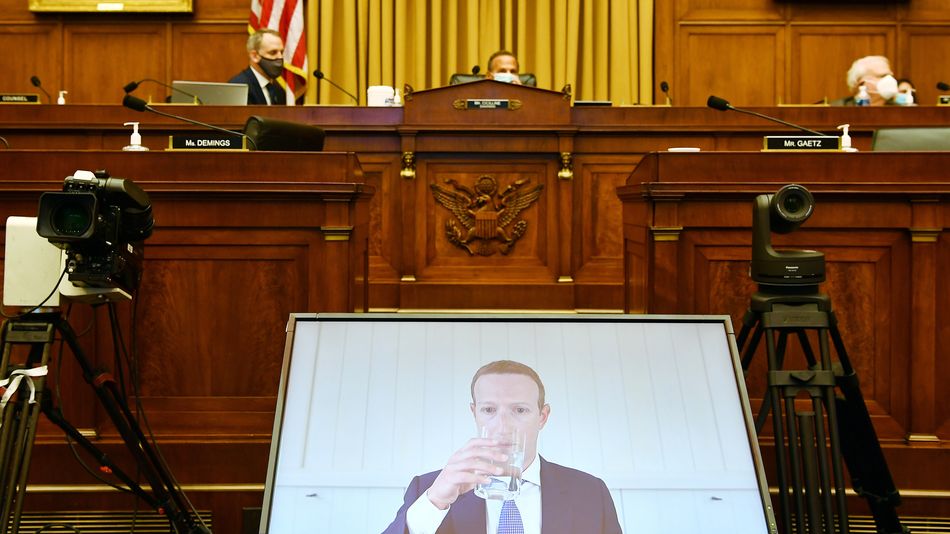Technology
Republicans and Democrats actually agree on breaking up Facebook


Facebook says it’s all about connecting people and building community. And it’s done just that, uniting Republican and Democratic lawmakers against it.
On Wednesday, the Federal Trade Commission and 46 states (along with Washington, D.C., and Guam) filed two antitrust lawsuits against Facebook. In the Washington version of a rare lunar eclipse, lawmakers on both sides of the aisle support the lawsuits.
One of their demands is that Facebook divest its ownership of Instagram and WhatsApp.
In response to the lawsuits, Facebook defended itself online, claiming it faces plenty of competition and that it “invested billions of dollars and millions of hours to make Instagram and WhatsApp into the apps that users enjoy today.”
Facebook has a good shot of winning. As Wired points out, it is notoriously difficult to bring a successful antitrust case.
It’ll be even harder in this case because prosecutors are using an unconventional interpretation of the law. They say the harm the company inflicted on consumers wasn’t financial, as in typical antitrust cases. Rather, it resulted in the degradation of users’ privacy.
High-profile members of both parties have spoken out in support of the lawsuits, saying that Facebook broke the law by buying up the competition, and selectively blocking competing services from using its products, in a way that hurt consumers. Now, there’s bipartisan support for the idea that Facebook should pay the consequences.
That includes Democratic heavy-hitters Bernie Sanders and Elizabeth Warren (who kicked off this whole antitrust “thing,” remember?), as well as some conservatives.
The FTC and 48 states now recognize what I’ve been arguing for a long time: Facebook’s power snuffs out competition and the Instagram and WhatsApp purchases should be unwound. There’s more work to do, but this is a big step in the fight to #BreakUpBigTech. https://t.co/BFqJSyYByw
— Elizabeth Warren (@SenWarren) December 9, 2020
I applaud this effort to end Facebook’s monopoly. Their greed knows no bounds, and they’ve used their power to try and control too much of political and economic life all over the world. The only thing that will stop Facebook is to say “enough is enough” and break it up. https://t.co/lRaqvNwj3T
— Bernie Sanders (@BernieSanders) December 10, 2020
In July, the House Judiciary Committee held a hearing on anti-competitive practices in Big Tech. Though Republicans and Democrats were not exactly congenial with each other, Ken Buck, a Republican member of its antitrust subcommittee, tweeted that “Facebook has crushed competition by breaking the law. Big Tech’s reckoning has just begun.”
Republican Rep. Josh Hawley, who has made a name for himself in part by critiquing Big Tech, also weighed in.
Of course, there’s not consensus on the issue. Two of the FTC’s Republican commissioners voted against bringing the suit, and plenty of Republicans and Democrats have said nothing on the matter. However, the FTC lawsuit is moving forward because its two Democratic commissioners, and its Republican leader, voted together.
Facebook dismissed the antitrust lawsuits as part of a general backlash against Big Tech’s effects on democracy, mental health, and oh so much more. But, these days, if you can unite Democrats and Republicans against you, you might be in serious trouble.
-

 Entertainment6 days ago
Entertainment6 days agoEarth’s mini moon could be a chunk of the big moon, scientists say
-

 Entertainment6 days ago
Entertainment6 days agoThe space station is leaking. Why it hasn’t imperiled the mission.
-

 Entertainment5 days ago
Entertainment5 days ago‘Dune: Prophecy’ review: The Bene Gesserit shine in this sci-fi showstopper
-

 Entertainment5 days ago
Entertainment5 days agoBlack Friday 2024: The greatest early deals in Australia – live now
-

 Entertainment4 days ago
Entertainment4 days agoHow to watch ‘Smile 2’ at home: When is it streaming?
-

 Entertainment3 days ago
Entertainment3 days ago‘Wicked’ review: Ariana Grande and Cynthia Erivo aspire to movie musical magic
-

 Entertainment2 days ago
Entertainment2 days agoA24 is selling chocolate now. But what would their films actually taste like?
-

 Entertainment3 days ago
Entertainment3 days agoNew teen video-viewing guidelines: What you should know















